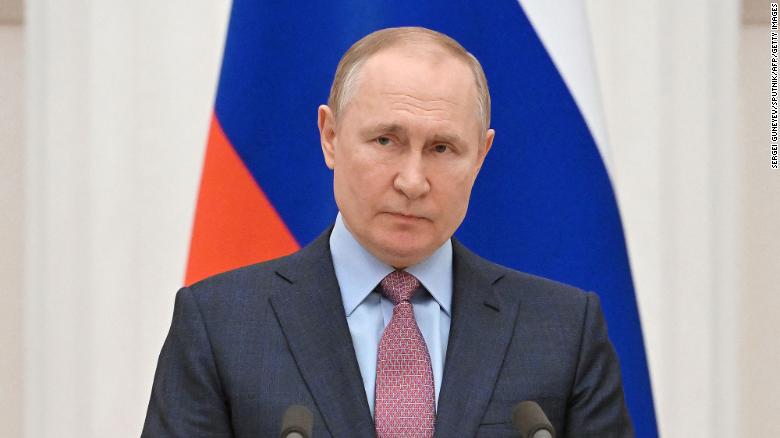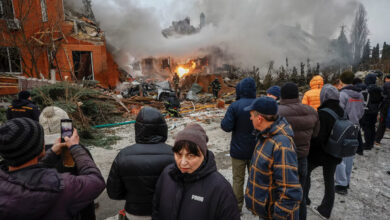
(CNN) – Western outrage, new sanctions, and promised state-of-the-art weapons came too late to save the man found shot dead next to his bike on a grassy bank outside Kyiv.
The man was pictured in a weekend of horrific imagery from Ukraine.
He was one of many blameless civilians whose destiny randomly collided with President Vladimir Putin’s barbaric invasion. Scenes being revealed as Russian troops pull back from Kyiv are causing searing flashbacks to atrocities last visited on Ukrainians by the Nazis in World War II.
This is one snapshot of the bloody price Ukrainian civilians are paying for Putin’s obsession with Russia’s Cold War humiliation, and it encapsulates how global responses to crimes against humanity — short of military action — struggle to keep pace with a vicious on-the-ground war.
The sense of revulsion about what is happening in Ukraine produced new momentum to hold Russia accountable on Monday. The European Union and Ukraine launched a new probe into potential war crimes in the Kyiv suburb of Bucha, where bodies were found strewn in the street. Members of Congress called on President Joe Biden to speed up the flow of weapons into Ukraine to beat back the invasion. The European Union is facing rising pressure to accept what would be a painful economic hit by totally cutting off Russian oil and coal exports.
Biden reacted to the growing catalog of inhumanity on Monday by calling for more sanctions and for a war crimes trial to take place against Putin.
“You may remember I got criticized for calling Putin a war criminal,” Biden said. “He is a war criminal. This guy is brutal.”
But the awful tragedy being revealed in Ukraine is that all of the measures the West is prepared to contemplate to punish Moscow and impact the long-term course of the war cannot do much to save civilians being targeted now.
And it is questionable whether any of the potential responses to the bloodlust by Putin’s troops will sway the ruthless Russian leader anyway.
The reflex for leaders to offer horrified condemnations, to demand accountability and to lash out at Putin is understandable. It’s also critical for the world not to be numbed into acceptance.
But the West is unlikely to halt Putin’s campaign of atrocities in the short term — especially since the Russian leader has proven immune from moral outrage. And given the scale of carnage already committed, including attacks on apartment blocks, hospitals and bomb shelters, he also appears to have long passed the point of any restraint.
New momentum for fresh punishments for Russia followed a weekend in which harrowing footage emerged of civilians shot dead, some execution-style, in Bucha. A CNN team also observed a mass grave in the town on Sunday and witnessed the removal of bodies from a basement on Monday.
Ukraine warned Monday that such scenes may be the “tip of the iceberg,” and President Volodymyr Zelensky said worse atrocities were being uncovered.
“There is already information that the number of victims of the occupiers may be even higher in Borodyanka and some other liberated cities,” Zelensky said.
“In many villages of the liberated districts of the Kyiv, Chernihiv and Sumy regions, the occupiers did things that the locals had not seen even during the Nazi occupation 80 years ago.”
Putin knows the West’s limits
The toughest sanctions ever, Russia’s new status as a global pariah and its cultural, diplomatic, economic and sporting isolation haven’t stopped the Kremlin strongman yet. Given Putin’s apparently secure political position, he shows no concern at being labeled a war criminal, and the chances of him standing trial are remote barring staggering political change in Russia.
Russia’s contempt for the notion of accountability, meanwhile, shone through its absurd claims that scenes of the decomposed bodies being pulled from the basement and images of civilians apparently killed execution-style were staged by the Ukrainians.
Armed with the world’s largest stockpile of nuclear warheads, Putin understands that the West is unwilling to intervene directly in Ukraine and risk a disastrous clash with Russia with measures like a no-fly zone to save civilians.
He is offering a lesson in why other dictators might consider pursuing nuclear arms. The kind of Western interventions to save civilians in places like Kosovo or Libya are prohibited in Ukraine, simply because of the implied power of the Russian leader’s arsenal — and his saber rattling earlier in the war.
Eighty years after dictators like Adolf Hitler in Germany or Joseph Stalin in the Soviet Union spread terror inside and outside their countries, Putin is creating an awful new spectacle for the 21st century — that of a dictator who cannot be deterred.
A special kind of impunity
Putin’s willingness to absorb punishments already clamped on Russia over the invasion gave him a special kind of impunity. Sanctions on the Russian economy and oligarchs may have a debilitating impact in the long term. But they have clearly failed as a tool of deterrence.
The Russian leader has also appeared willing to tolerate heavy casualties among his troops in the face of heroic resistance from Ukrainian forces. The recalibration of Russian strategy to trying to consolidate control of eastern regions may, however, show even Putin can be moved by events over time.
From the outside, the war is a military, diplomatic and economic disaster for Russia after its failure to seize key objectives. But it can still be a perverse success for Putin if his goal is simply to destroy as much of Ukraine as possible and create a victory parade for Russian state media.
So in many ways, he’s playing an asymmetric game with the West, whose sanctions and punitive measures are based on a more logical view of Russia’s interests and its own limitations.
Still, the White House reacted to the horror emerging from Ukraine by promising to quicken the pace of military, humanitarian and economic aid to Kyiv.
“The images from Bucha so powerfully reinforce now is not the time for complacency,” US national security adviser Jake Sullivan said Monday.
Such help could shorten the war and alleviate attacks on civilians in weeks and months to come. But Putin has been besieging and bombarding Ukrainian cities for weeks. Millions of people were already driven out of the country into Western Europe as refugees.
A Nuremberg-style trial?
Momentum is also growing for some kind of formal mechanism to hold Russian leaders accountable for war crimes. Former Ukrainian Prime Minister Arseniy Yatsenyuk told CNN’s Jake Tapper on Monday that the invasion was the biggest disaster in Europe since World War II, and merited a system of justice similar to the Nuremberg Trials of Nazi war criminals.
“We need to prepare right now. We need to urgently launch a kind of joint investigative group in order to be prepared to bring to justice Putin and to see Putin sitting behind … bars.”
But the nature of the post-Cold War international system would complicate the establishment of a system that enjoyed global legitimacy. Russia, for instance, would be certain to veto any attempt to involve the United Nations with its Security Council vote. China would also seek to derail any effort to impose accountability for human rights abuses given its own repression of Uyghur Muslims that the United States has branded a genocide.
Still, the difficulty of bringing Putin to justice does not mean that Russians lower in the chain of command cannot be investigated, though the International Criminal Court in The Hague doesn’t conduct trials in absentia. The organization does, however, already have investigations in Ukraine, which has accepted its jurisdiction even though it’s not a member of the court.
One potentially significant new blow against Russia could come from Europe as the European Union draws up new sanctions. French President Emmanuel Macron backed a ban on Russian coal and oil exports to the EU as soon as this week.
But it’s doubtful whether other big powers, including Germany, would go that far, given the energy shortages and spikes to already high inflation that would result.
Such a move would undoubtedly make strides in starving funding for the war in Ukraine.
But in the shorter term, it would also beg two questions: Is Putin even vulnerable to pressure anymore? And how many more Ukrainian civilians will die until he is?




